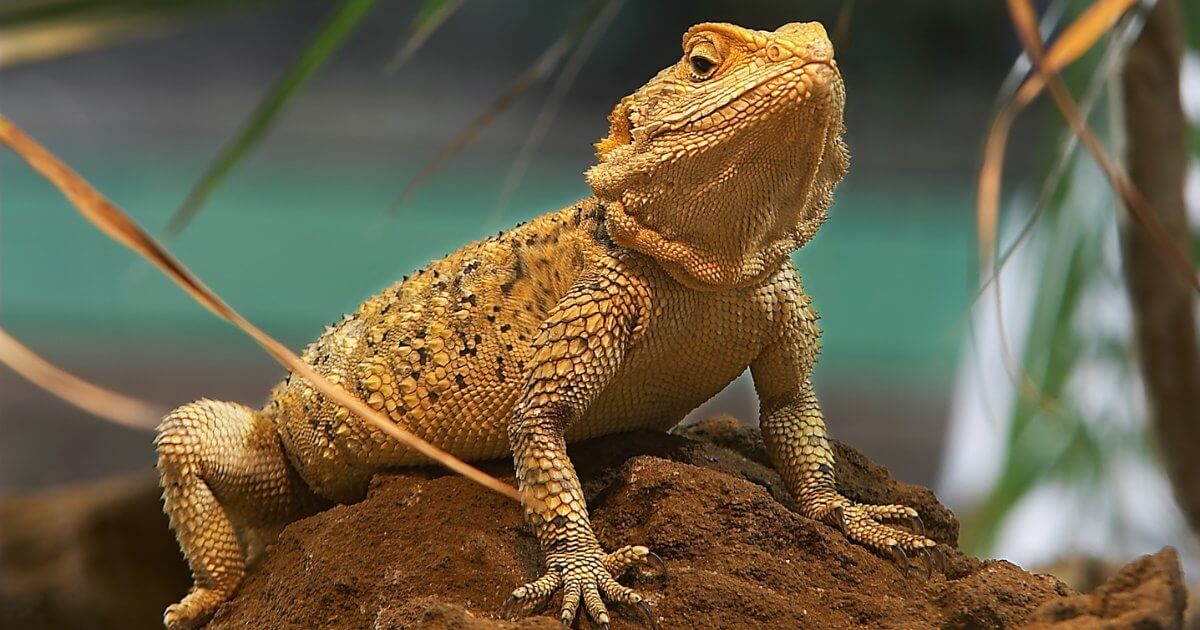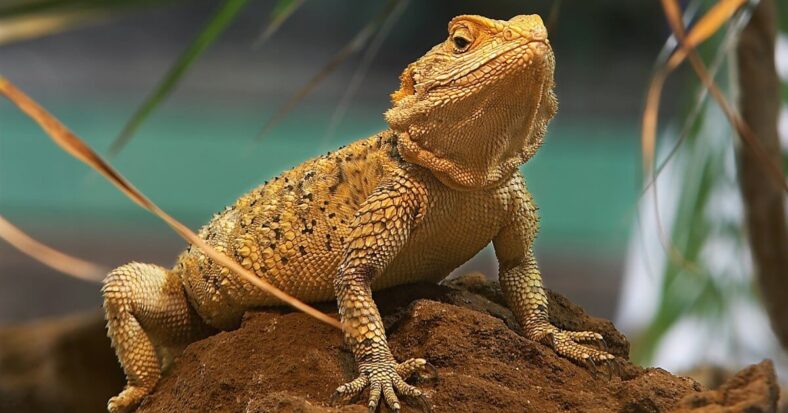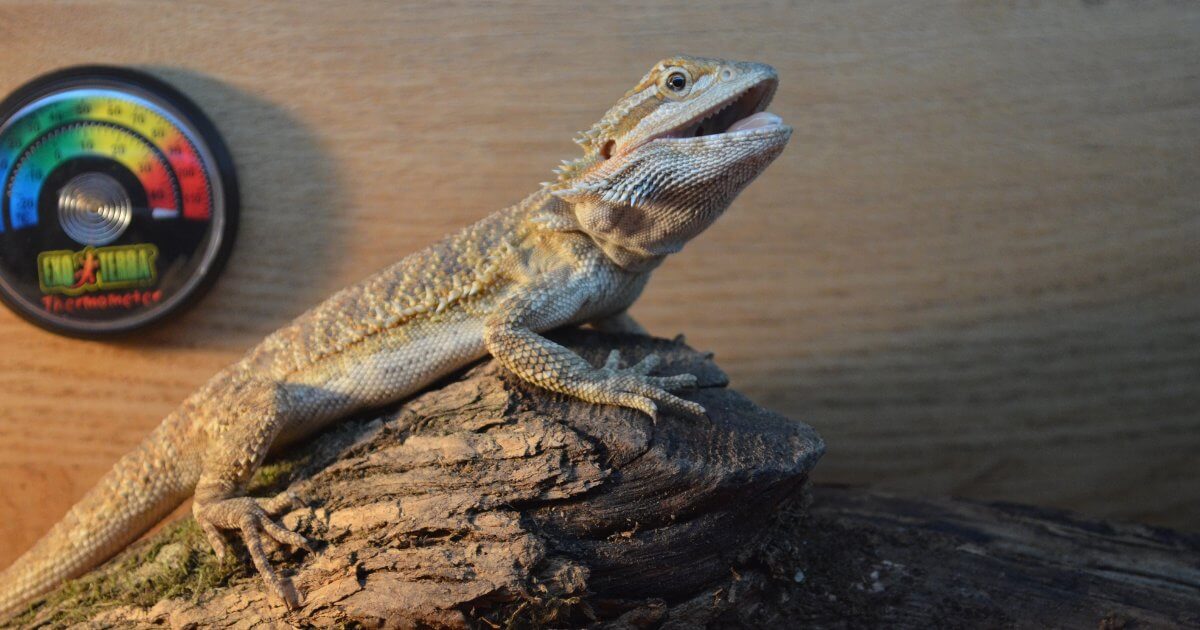
As an experienced bearded dragon owner and enthusiast, I’ve encountered my fair share of cases involving dehydrated bearded dragons.
To ensure their well-being, it’s essential to understand how bearded dragons drink water and meet their hydration needs.
You can learn more in our comprehensive guide on bearded dragon hydration: Do Bearded Dragons Drink Water?
Content:
I cannot stress the significance of maintaining proper hydration for the well-being of these remarkable reptiles enough.

In this blog post, we’ll discuss the significance of hydration, how to recognize the signs of dehydration in bearded dragons, and the best ways to treat and prevent it.
Let me share some of my experiences and insights to help you ensure your bearded buddy stays healthy and well-hydrated!
My Personal Experience with Spike’s Dehydration
One unforgettable experience I had with dehydration was with my beloved bearded dragon, Spike.
Spike was always an energetic and healthy pet, but one day I noticed a sudden change in his behavior and appearance.
His eyes appeared sunken, and his once-vibrant skin had become wrinkled and dull. Recognizing these as classic signs of a dehydrated bearded dragon, I knew I had to act quickly to help him.
Initially, I began by ensuring that Spike had access to fresh water in his enclosure, both in a shallow dish and by misting the vegetables he consumed.
Furthermore, I also increased the humidity level in his habitat to help promote hydration.
However, despite these efforts, Spike continued showing signs of dehydration, so I decided to consult a reptile vet.
Upon examination, the vet confirmed that Spike was indeed dehydrated and recommended soaking him in a shallow warm bath for about 15 minutes daily.
This method helped Spike absorb water through his vent and skin, gradually restoring his hydration levels. The vet also advised me to closely monitor Spike’s environment and adjust the humidity levels as needed.
Throughout this experience, I learned the importance of being vigilant and recognizing the early signs of dehydration in bearded dragons. By promptly addressing Spike’s needs and seeking professional advice, I was able to restore his health and well-being.
Consequently, this experience has inspired me to share my knowledge and help other bearded dragon owners avoid the complications that can arise from dehydration.
Importance of hydration for bearded dragons
Bearded dragons need adequate hydration for proper digestion, shedding, and overall health. Dehydration can lead to serious health issues and even become life-threatening if left untreated.
I once had a bearded dragon named Spike, who suffered from dehydration due to insufficient water intake. Thankfully, I was able to recognize the symptoms early and intervene before his condition worsened.
How To Tell If Bearded Dragon Is Dehydrated?
It’s crucial to know how to identify the signs of dehydration in your bearded dragon. There are both physical and behavioral indicators to watch out for:
Physical Signs of Dehydration
- Sunken eyes
- Wrinkled or loose skin
- Darkened or dull coloration
- Dehydrated bearded dragon poop
Behavioral Signs of Dehydration
- Lethargy or inactivity
- Loss of appetite
- Changes in bowel movements
What Does A Dehydrated Bearded Dragon Look Like?
A dehydrated bearded dragon can exhibit several physical and behavioral signs that indicate dehydration. Here’s what a dehydrated bearded dragon may look like:
- Sunken eyes: Their eyes may appear sunken, giving them a tired or unhealthy appearance.
- Wrinkled or loose skin: The skin might look wrinkled or loose, lacking the typical smooth texture of a well-hydrated bearded dragon.
- Darkened or dull coloration: A dehydrated bearded dragon may display darker or duller colors than usual, indicating that they need hydration.
- Lethargy or inactivity: The bearded dragon might become less active and show signs of lethargy, spending more time basking or resting instead of being active and exploring.
- Loss of appetite: A dehydrated bearded dragon may lose interest in food, leading to weight loss or nutritional deficiencies.
- Irregular bowel movements: Their poop might be dry, hard, and difficult to pass, indicating constipation or other digestive issues caused by insufficient water intake.
If you notice any of these signs, it’s essential to take action and provide appropriate hydration methods for your bearded dragon.
Physical Signs Of Dehydrated Bearded Dragon
Before we dive into the behavioral signs of dehydration in bearded dragons, let’s first discuss the physical symptoms that might indicate your pet is in need of more water.
Recognizing these signs early on is essential to prevent further health issues and ensure your bearded dragon stays healthy and happy.
Sunken eyes
Dehydrated bearded dragon eyes may appear sunken, which is a clear indication that they’re lacking water. This happened to Spike before I took action to rehydrate him.
Wrinkled or loose skin
If you notice that your bearded dragon’s skin appears wrinkled or loose, it could be a sign of dehydration. I’ve seen this symptom in several cases, including Spike’s, and it’s a telltale sign that your pet needs more water.
Darkened or dull coloration
A dehydrated bearded dragon may have darker or duller colors than usual. This is another sign I’ve observed in the past, and it indicates that your dragon needs hydration.
Dehydrated bearded dragon poop
Dehydrated bearded dragon poop is another sign to watch out for when trying to determine if your pet is dehydrated.
A dehydrated bearded dragon’s feces may appear dry, hard, and difficult to pass.
Constipation can directly result from insufficient water intake, and it is crucial to address this issue promptly.
Behavioral Signs of Dehydration
Now that we’ve covered the physical signs of dehydration, it’s essential to understand the behavioral changes that might also indicate your bearded dragon is dehydrated.
Keep a close eye on their behavior to catch any early warning signs and ensure their health and well-being.
Lethargy or inactivity
A dehydrated bearded dragon might become lethargic or inactive. When Spike was dehydrated, he was less active than usual, and it was a major concern.
Loss of appetite
If your bearded dragon suddenly loses interest in food, it might be due to dehydration. Spike experienced a loss of appetite before I realized he was dehydrated.
Changes in bowel movements
Dehydrated bearded dragons may have irregular bowel movements, such as constipation or diarrhea.
This was another sign I noticed in Spike’s case, prompting me to take action.
Stay tuned for the next sections, where we’ll discuss the causes of dehydration in bearded dragons, how to rehydrate a dehydrated bearded dragon, and ways to prevent dehydration.
Don’t forget to sign up for our newsletter to receive updates on new content related to bearded dragon care!
Causes of Dehydration in Bearded Dragons
Understanding the causes of dehydration in bearded dragons is crucial for effective prevention and treatment.
Let’s discuss the various factors that may lead to dehydration in bearded dragons.
Insufficient water intake
Not providing enough fresh water for your bearded dragon to drink can lead to dehydration.
Bearded dragons don’t drink water as often as other animals, so it’s essential to encourage them to stay hydrated. In Spike’s case, I had to improve his water source to help him drink more regularly.
Inadequate humidity levels
Low humidity in your bearded dragon’s enclosure can also contribute to dehydration.
Maintaining proper humidity levels is crucial for keeping your pet well-hydrated and comfortable.
Underlying health issues
Sometimes, dehydration can be a symptom of an underlying health issue, such as kidney problems or parasites.
In such cases, it’s vital to consult a reptile vet for proper diagnosis and treatment.
How to Help a Dehydrated Bearded Dragon: Rehydration Tips
If you’ve identified that your bearded dragon is showing signs of dehydration, it’s crucial to act quickly and take the necessary steps to help them recover.
In this section, we’ll explore some effective rehydration tips that can significantly impact your pet’s well-being.
Providing fresh water
First and foremost, ensure that your bearded dragon has access to clean, fresh water at all times.
Use a shallow dish that’s easy for them to drink from, and make it a habit to change the water daily to maintain its freshness.
Soaking or misting
Next, consider gently misting your bearded dragon with water or giving them a lukewarm bath to help rehydrate their skin.
When I discovered Spike was dehydrated, I soaked him in a shallow bath for 15-20 minutes, significantly improving his hydration levels.
Consulting a vet
Lastly, if you suspect your bearded dragon is severely dehydrated or has an underlying health issue, don’t hesitate to consult a reptile vet immediately. They can provide proper guidance and treatment to help your pet recover and thrive.
Preventing Dehydration in Bearded Dragons
Preventing dehydration in bearded dragons is vital for their overall health and happiness.
To keep your scaly friend well-hydrated and thriving, it’s essential to implement proper care strategies and closely monitor their environment.
This section will cover tips and best practices to help you avoid dehydration in your bearded dragon and maintain its well-being.
Ensuring proper hydration methods
Offer a shallow water dish and use a dropper or syringe to gently drip water on your bearded dragon’s snout, encouraging them to drink.
You can also provide water-rich foods like fruits and vegetables to supplement their hydration. Mist their enclosure occasionally to raise humidity and promote proper hydration.
Monitoring environmental factors
Keep humidity levels within the recommended range (30-40%) by using a reliable hygrometer.
Adjust the enclosure’s humidity as needed by adding or removing water sources, such as a water dish or a humid hide.

Maintain appropriate temperatures in the basking and cool areas to avoid excess water loss through evaporation.
Regular health checks
Perform regular health checks on your bearded dragon and observe their behavior to catch any signs of dehydration early. Addressing the issue promptly can prevent more severe health problems.
Schedule routine visits with a reptile vet to ensure your bearded dragon stays healthy and hydrated.
Educating yourself on bearded dragon care
Continuously learn about bearded dragon care, their needs, and best practices to ensure their overall health and well-being.
Stay up-to-date on the latest research, connect with other bearded dragon owners, and seek advice from experienced keepers to prevent dehydration and other health issues.
Frequent Questions About Dehydrated Bearded Dragon
If your bearded dragon is dehydrated, start by providing fresh water in a shallow dish and misting their enclosure to raise humidity levels. Consider giving them a lukewarm soak and consult a reptile vet for further guidance.
Dehydrated bearded dragon poop typically appears dry, hard, and difficult to pass, which can result in constipation.
Pedialyte can be used in small amounts to help hydrate a bearded dragon, but always consult with a reptile vet before using it to ensure proper dosage and safety.
The fastest way to hydrate a bearded dragon is by offering fresh water, providing a lukewarm soak, and misting their enclosure. You can also provide water-rich foods like fruits and vegetables.
Soaking a bearded dragon in a diluted Pedialyte solution can help with hydration, but it’s essential to consult with a reptile vet to ensure proper dilution and safety.
You can use a syringe to gently drip water onto your bearded dragon’s snout, encouraging them to drink.
However, be careful not to force water into their mouth, as this can cause stress or aspiration.
An electrolyte soak can be beneficial for bearded dragons in some cases, but it’s crucial to consult a reptile vet for guidance on the appropriate solution and duration of the soak.
Signs of dehydration in bearded dragons include sunken eyes, wrinkled or loose skin, darkened or dull coloration, lethargy, loss of appetite, and changes in bowel movements.
Forcing your bearded dragon to drink water can cause stress and potentially lead to aspiration. Instead, gently encourage them to drink by dripping water onto their snout using a dropper or syringe.
Soaking bearded dragons can help hydrate them, as it aids in rehydrating their skin and can encourage them to drink the water they’re soaking in.
A 15-20 minute lukewarm soak is sufficient for hydrating a bearded dragon. Monitor your pet closely during the soak and remove them immediately if they show signs of distress.
Conclusion About Dehydrated Bearded Dragon
Recognizing the signs of dehydration in bearded dragons is crucial for ensuring their well-being.
You can keep your scaly companion happy, healthy, and hydrated by being attentive to your pet’s needs and taking preventative measures.
Ensuring proper hydration for your pet’s health and well-being is a vital responsibility for bearded dragon owners.
Following the advice in this blog post, you can take care of your pet and ensure they lead a healthy and fulfilling life.
I hope you found this post helpful!
To stay informed about bearded dragon care, follow our blog or sign up for our newsletter to receive updates on new content.
If you have any questions or concerns, feel free to leave a comment below, and I’ll do my best to help!






